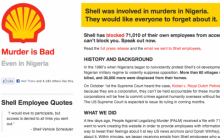
In the 1990's when Nigerians began to nonviolently protest Shell’s oil development, Shell collaborated with the Nigerian military regime to violently suppress opposition. More than 60 villages were raided, over 800 people were killed, and 30,000 more were displaced from their homes.
On October 1, 2012 the Supreme Court heard the case, Kiobel v. Royal Dutch Petroleum, in which Shell is arguing that because they are a corporation, they can't be held accountable for these murders in US Courts.
A few days before, the Yes Lab and People Against Legalizing Murder (PALM) received a file with 71,010 emails of Shell employees. We went to work creating this website in order to provide employees with information about the case, as well as an easy way to tweet their feelings about it at key US news anchors (and Oprah Winfrey). We emailed all 71,010 employees about it. Within minutes, we began receiving emails from Shell employees who were intrigued and wanted more information, but couldn't access the site because Shell's IT Department had blocked it.
The website - MurderIsBad.com
Selected press:
- Hoaxers target Shell with bogus Nigeria news, Reuters
- Aided by Yes Men, activists strike at Shell, Salon
- Murder is Bad – Even in Nigeria, Price of Oil
- Elaborate hoax targeting the Kiobel v Shell case currently before the US Supreme Court, royaldutchshellplc.com (a critical, non-commercial site by Shell employees)
- Kiobel v. Royal Dutch Petroleum Co., Center for Constitutional Rights (outline of the current case and its history)